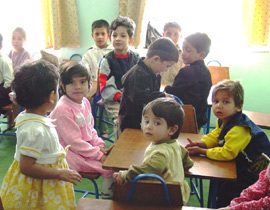 Image via Wikipedia
Image via WikipediaAlan November - keynote
Alan November started with an anecdote about his first trip to Australia, and students who were involved in doing research for the NASA space shuttle - and how motivating it was for the students involved. He moved on to use Poll Everywhere to engage the audience.
Alan started his career by teaching math and oceanography. He was teaching students who were incarcerated on an island. He offered extra help with both subjects, but only had requests about oceanography - especially tides and hypothermia (that being the escape route). Early on his career he realised you could be a great teacher for anyone who is desperate!
"Before we talk about technology we need to talk about teaching and learning" - we need to stop spending money on stuff. The question is are we doing things right without the technology, because just adding the technology to a system that is broken is not going to fix it. Alan showed a video that had Harvard graduates being interviewed about the question around where the mass of a tree comes from. The response to getting the answer wrong is as interesting as the answers themselves. The graduates had all studied photosynthesis, but did not know the answer was CO2 - and in fact found the actual answer 'disturbing'. Another video showed younger kids answering the same question - they gave the same answer as the Harvard graduates.
In the US they have a problem - it is very difficult to apply what you learn in school outside of school. A third video was shown from You Tube about Professor Mazur. He received a lot of positive student feedback but was worried that students were passing exams without understanding the underlying concepts. Mazur got an iPod touch - he decided that he was going to immediately test students as soon as he teachers (but isn't this just glorified clickers...hmmm). He asked a simple question and the majority of the students in his class do not get it right. People learn in social groups - when you actually track students it is how and where they learn, it is the conversations that they have outside of class where the learning actually takes place. What he did was stop all lectures and stopped giving content. He also swapped what was happening in face-to-face sessions, so that what was homework was now classwork, and what was classwork was now homework.
The most important things about learning is how students process knowledge, that is the most important aspect. What is the most important aspect of a classroom - is it the knowledge of the teacher? Or is it the processing of knowledge to the point where it becomes synthesised, internalised and then externalised, and personalised. The building of mental models and sharing of ideas around their conceptions is central to effective learning. November believes that there must be much more testing for misconceptions. The knowledge and misconceptions of children therefore become available during the actual learning cycle, and therefore give the teacher immediate feedback about how children are learning.
What are the most important relationships in learning? Teacher to teacher? Students to students? etc. Learning is social - sitting without engaging with other people is not the best way of learning. Lessons and lectures often just introduce the initial, surface concepts, and it is once the students leave the classroom, where students ask each other for help. Tutorials made by students for other students (especially in the form of multimedia) - Alan showed an example of a student-made tutorial about prime factorisation. The last words of the student were "thanks for listening". It took the student 2 hours to design a tutorial like this. The teacher does not a give a grade, he helps with the quality, and everything is voluntary - but this is an option rather than homework (homework would take about 7 mins). When she designs a tutorial to help her friends she feels that is important, whereas homework, she feels is not important as it was just for her.
Is it, therefore, more effective to have students developing tutorials for other students? This however will require a massive shift in control toward a team approach to learning. It is easy to underestimate children. Immediate feedback is central to success. The education system has failure built-in because there is such a delay between making an error and receiving feedback. ICT can help reduce the time-lag for feedback to zero.
What is the role of children in school? Is it to figure out what the teacher already knows? Or is it to contribute, to create, to help, to play an active, meaningful role? Alan showed another video where children were working together to make a podcast - one child goes around and takes photographs, and another interviews people. Every week the students produce a podcast that reflects on their learning, and they work in a self-directed team. They sort out the subject, roles, process etc each week - the students are 7-8 years age range. The children are joyful about creating the content that helps other children, and they have a global voice. People around the world can access their stuff. Usually, when students have finished work it goes nowhere. Even children who cannot read or write can take photos, and make a contribution - to add value to the effort of their classmates.
Education as a concept needs to change before learning is centralised, and students actually learn in a way that is relevant and that celebrates their input into their community, as well as other communities around the world.

![Reblog this post [with Zemanta]](http://img.zemanta.com/reblog_a.png?x-id=00f58c5c-febb-4c38-ad77-80922cfe020f)





No comments:
Post a Comment